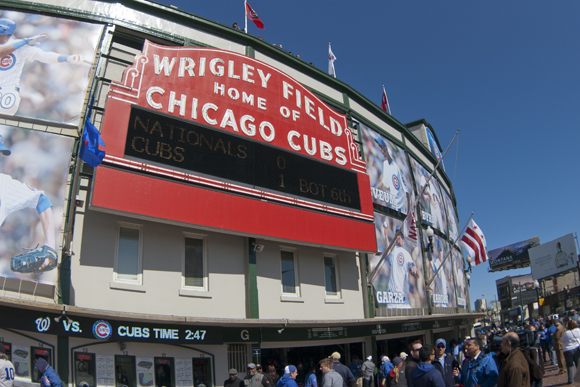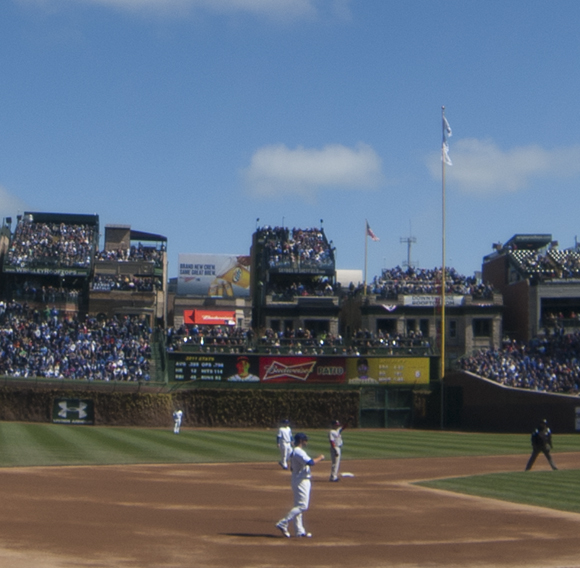
The Rahm Emanuel plan for Wrigley Field renovations calls for the historic ballpark’s landmark status to be relaxed, allowing the Chicago Cubs to erect massive scoreboards and other signage in the Friendly Confines.
The plan from the Chicago mayor and the Cubs ownership also calls for streets around the ballpark to be closed on popular game days, adding a carnival-like atmosphere to the proceedings.
If this sounds like that the Boston Red Sox did in their makeover of Fenway Park in the past decade, you’re right: the team did pretty much the same thing in closing down Yawkey Way before games to set up an extended food court/concession area. And the Red Sox did indeed add more signage to the ballpark, through it was done in a very tasteful way.

The issues at Wrigley Field are far more complicated, however. Tom Ricketts decried the landmark status for the ballpark as being far too confining: little changes are scrutinized to the nth degree, like the installation this season of a small videoboard in the right-field corner. (For the record: we were there opening day and the videoboard — shown above — was not a distraction; although there were few advertisements; most of the time it displayed pitcher/batter information.) And there’s the issue of how Wrigley Field relates to the surrounding neighborhood, as the owners of rooftop seating and ads placed beyond the ballpark are beyond the control of the Cubs. At times Chicago government (usually in the form of Alderman Ton Tunney) has sided with the local ad owners versus the Cubs; Chicago politics at their best.
More outfield signage behind the Wrigley Field bleachers, possibly including a Jumbotron in right field. Street closings on Sheffield and Waveland every game day to make way for money-making street fairs.
Sponsored “gateway” archways that welcome people to “Wrigleyville: Home of the Cubs” from various directions. More concerts and football games at Wrigley along with a stadium club, restaurant and several thousand premium-priced seats.
Determined to renovate 98-year-old Wrigley without overburdening taxpayers, sources said Mayor Rahm Emanuel is pushing a plan to relax the ballpark’s landmark status and allow the Cubs to wring as much as $150 million in advertising and sponsorship revenues out of the stadium and surrounding streets.
One of the great charms of the Wrigley Field experience is the lack of electronic messaging. The scoreboard is still the iconic center-field manual scoreboard, and you still have the ivy on the outfield walls originally planted by Bill Veeck. You have a lot of cultural history at stake.
But there are some fundamental issues of fairness here. Why should the Cubs be prevented from capitalizing on their assets in order to preserve views of advertisements outside the ballpark? True, the Cubs receive 17 percent of revenues from the rooftop bleachers, but that’s a drop in the bucket when compared to the potential revenues of additional signage at the ballpark. We don’t see the need for a mondo Jumbotron at Wrigley Field, but why not some fixed signs a la Fenway Park? And closing down local streets on game days just makes sense. The area around Wrigley Field is a traffic jam on a big day anyway, so closing down Sheffield and Waveland to traffic isn’t a big deal: the area is impassable. (Heck, we’d close down Addison as well and provide a clear pathway between the train station and the corner of Clark and Addison. Free Captain Morgan!)
Other improvements are simply no-brainers, like the addition of an expanded club level and scheduling more concerts and football games. Every vendor in Wrigleyville would love to see more crowds at the ballpark.
The plan, we’re told, has the potential to raise some $150 million in revenues; if adopted, the team would commit to spending $200 million more in ballpark improvements. Also potentially part of the plan: a reduction in the city’s take of future amusement-tax revenues. The tax wouldn’t be rebated to the Cubs, as the team originally asked, but future growth would come back to the team to pay off construction bonds, and the city would be guaranteed a certain level of tax revenues.
A match at Wrigley Field is still a magical experience: the timeless quality of a Cubs game at a time when our lives are full of technological distractions and rapid change is good for the soul. The trick for the Cubs will be to retain the magic of the Wrigley experience without selling out the Wrigley Field legacy.
RELATED STORIES: Illinois guv: No public money for ballpark renovations; City, Cubs finalizing terms of Wrigley Field renovations; Ricketts: Time to talk Wrigley Field public funding again; Want to buy a chunk of Wrigley Field? Dream on;Gammon rips Wrigley Field, defends Ricketts; Mayor Rahm: No to city aid for Wrigley Field;Poll: Voters oppose public funding of Wrigley Field renovations; State funding of Wrigley Field renovations dies as Assembly adjourns
—-
Share your news with the baseball community. Send it to us at editors@augustpublications.com.
Are you a subscriber to the weekly Ballpark Digest newsletter? You can sign up for a free subscription at the Newsletter Signup Page.
Join Ballpark Digest on Facebook and on Twitter!
Follow Ballpark Digest on Google + and add us to your circles!
